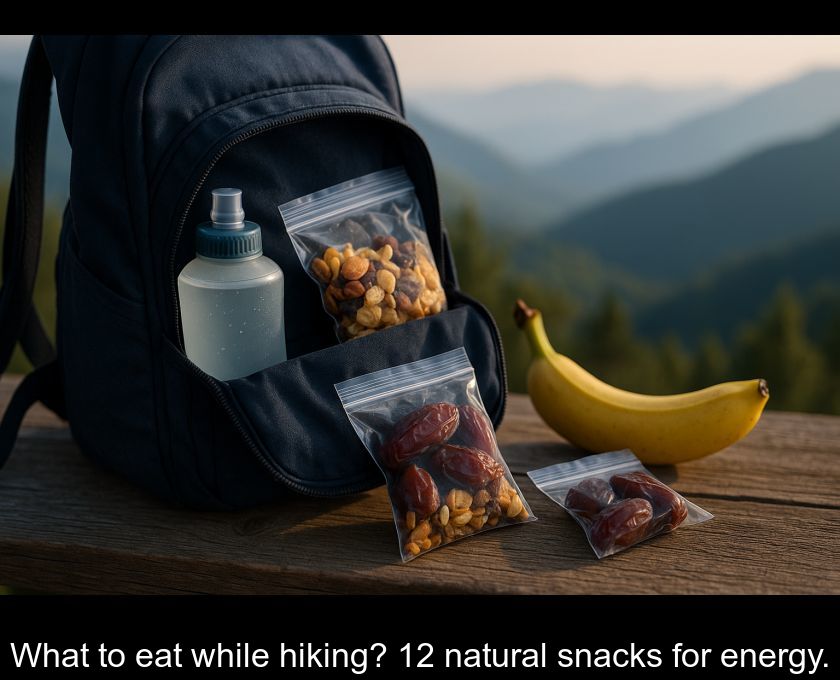What To Eat While Hiking? 12 Natural Snacks For Energy.
You're setting out to walk, run, cycle... and you always hesitate when it comes to packing your backpack or belt pouch. No need for complicated industrial products, your body mainly needs readily available carbohydrates, a bit of salt, and water. Here are 12 clever, simple, natural snacks that travel well, with clear portion sizes and preservation tips—essentially the anti-slump kit for your active outings.
Why bet on carbohydrates during exertion
In endurance, the body needs a regular intake of carbohydrates to maintain the pace, avoid hunger pangs, and keep a clear head. Recommendations converge on aiming for about 30 to 60 grams of carbohydrates per hour of effort, and up to 90 grams per hour for very long outings or trained athletes, adjustable based on your tolerance, heat, and elevation changes. The idea is not to "gorge" oneself, but rather to spread out the intake every 15 to 20 minutes for stability... without upsetting digestion.
Good to know, dried fruits are perfect for trails, packing energy into a small volume. Dates, in particular, are rich in carbohydrates and potassium, a reliable choice for a natural energy boost, without unnecessary packaging... or complicated recipes. To give an idea, 100 grams of dates provide about 280 kcal and over 60 grams of carbohydrates, making them an effective snack during prolonged effort.
12 Quick, Natural, and Easy-to-Enjoy Snacks
General tip: prepare individual bags of 30 to 40 grams, it's easier to dose on the fly, and you avoid eating everything at once out of boredom... or gluttony.
“Ready to munch” Dates
Natural, soft, rich in quickly available carbohydrates. Have 2 to 3 dates every 20 to 30 minutes depending on the intensity, simple and effective.
Almond Butter Stuffed Dates
Open the date, remove the pit if necessary, add a dollop of almond paste, close it up, done. The sugar + a bit of fat combo delays hunger, holds up well in the bag.
Homemade Trail Mix
A simple mix of unsalted nuts + raisins + cranberries. Aim for a small handful, about 30 grams, every 30 to 45 minutes on a moderate hike, convenient and adjustable. Dry fruit and nut mixes are a classic outdoor snack staple.
Fully Ripe Banana
Yes, basic, but formidable. Good digestive tolerance, holds up well if wedged against the side of the bag, provides carbohydrates and potassium, perfect for a hill climb... just be sure to avoid turning it into mush.
Unsweetened Applesauce in a Pouch
Ultra-convenient when you're not too hungry but your brain is craving sugar, swallowed in a few sips, no need to chew, thicker versions exist to fill you up more. Hiking federations even list these “ready to drink” formats among the simple race foods.
Rice Cakes + Peanut Butter
One cake, a dollop of paste, fold it in baking paper, easy to dose, nice crunch, fills you up without weighing you down.
Whole Wheat Bread Rolled with Cream Cheese
An improvised mini wrap, soft texture, a bit of protein, remains digestible during moderate exertion, perfect for family hiking.
Dried Figs or Apricots
An alternative to dates, quick sugar, fiber, minerals, clear portions per unit. Carry 3 or 4 pieces, depending on your appetite and duration. Dried fruits are part of the recommended race foods for hiking.
Homemade “3 Ingredient” Bars
Blended dates, oat flakes, almond pieces, press down, cut, wrap. No baking, zero additives, you control the texture, that's the whole point.
Dried Pears + A Few Nuts
Sweet, crunchy, “healthy” fat, good satiety for long rolling sections, chew slowly, it sets the pace.
Roasted Chickpeas
A savory snack for a change, crunchy, a bit of protein, holds up well in a zip bag, pleasant when you've had enough of sweets.
Mini Sandwich with Salted Butter and Honey
The good old sweet and salty mix, ideal in hot weather, when you sweat a lot and start to run low on salt... simple, economical, effective.
Hydration and Salt: The Anti-Slump Combo
In temperate conditions, a good baseline for trail hydration is about half a liter of water per hour, which should be adjusted based on heat, humidity, altitude, and intensity. Drink in small, regular sips, and don't wait until you're thirsty—it's a good habit to prevent dehydration.
When it's hot, uphill, or windy, fluid loss can skyrocket, ranging from 0.5 to over 2 liters per hour in extreme cases, hence the importance of planning for water stops and, if possible, a light electrolyte. Sweat also carries away sodium, which is why it's beneficial to have something salty or a drink containing about 1.2 grams of salt per liter for prolonged efforts, tailored to your sensitivity and daily diet.
Note that sports recommendations suggest adding carbohydrates to your drink for long-duration activities, but for leisure hiking, water and a few simple snacks are often quite sufficient. The key is to alternate water, small bites of carbohydrates, and a bit of salt if you sweat a lot, especially in the summer.
Portions, timing, transportation, preservation
To stick to the 30 to 60 grams of carbohydrates per hour, think in units, it's more tangible. One Medjool date has about 18 g of carbohydrates and 66 kcal, so two dates already bring you to around 35 g of carbohydrates, perfect for a leisurely hour... and you can top up with a piece of fruit or a sip of applesauce if the slope gets steeper.
For transport, opt for small transparent zip bags, 30 to 40 g per bag, or flat boxes if you're concerned about crushing. Dried fruits have the advantage of very good preservation, and hiking federations clearly classify them among practical race foods, just like drinkable applesauce and some low-fat biscuits.
Finally, regarding "tolerance", start with the simplest and move to the more complex, test your snacks on short outings before setting off for 6 hours, to avoid gastrointestinal surprises. Mixes of nuts, dried fruits, and a few cereals work well for many participants, with a very decent weight, energy, and satiety ratio.
Safety Reminder
Drink regularly, split your intake, don't unnecessarily overload the bag... and keep a dose of salt if you sweat a lot. Avoid "overdrinking" pure water for hours without eating, as there is a risk of hyponatremia if sodium levels drop too much; a broth or salty snack often does the trick.
Nota bene
These tips are meant for the majority, but stay attuned to your own feelings. If you have a specific health condition or are on a particular diet, seek advice from your healthcare provider. Children do not have the same needs or tolerance for extended exertion; plan for more breaks, very digestible snacks, plenty of water, and a hat... obviously.
In summary
Simple, natural, well-portioned snacks, a bit of salt, water sipped in small amounts—that's the foundation. Dates, other dried fruits, and nut mixes are perfect allies for quickly replenishing energy without turning your bag into a mobile grocery store. Stay light, divide portions, plan for water refill points, and enjoy—that's what being outdoors is all about, after all.








